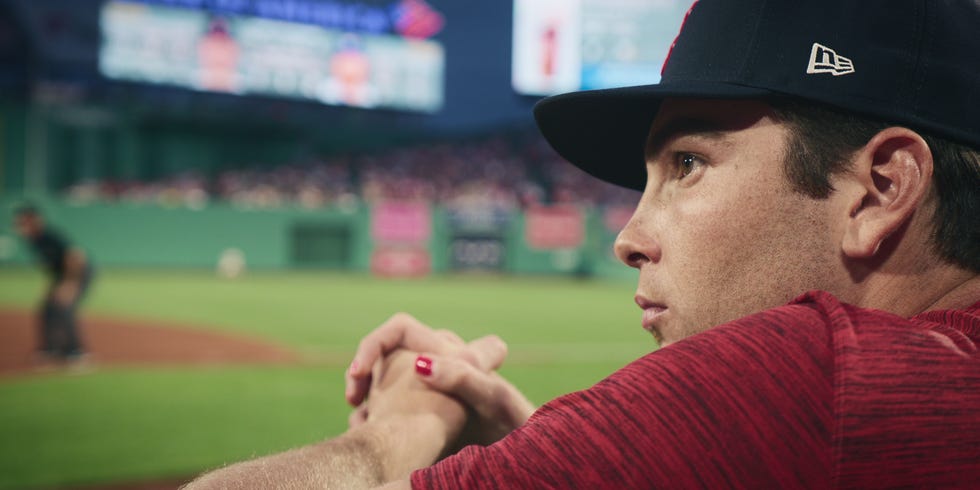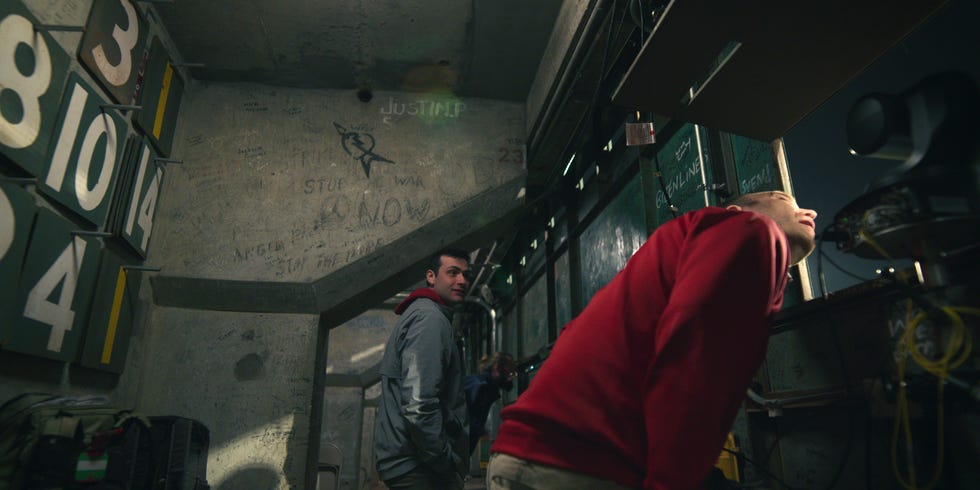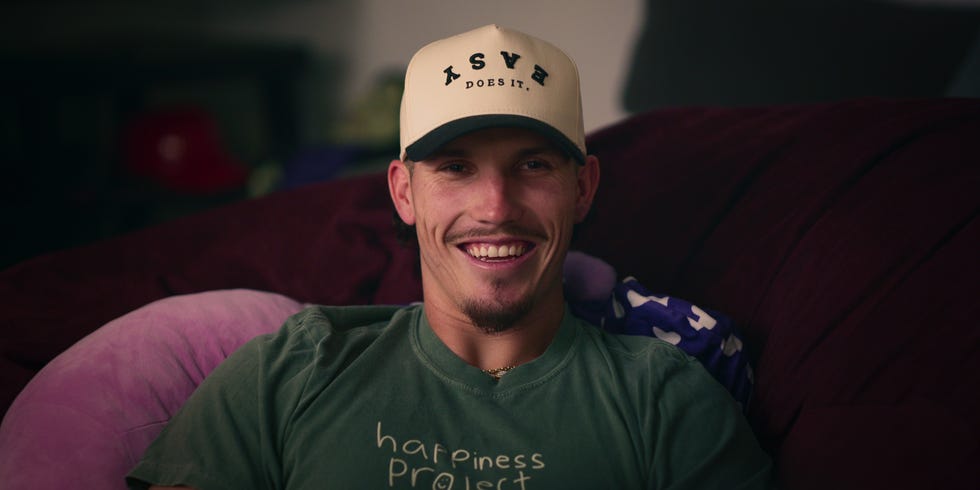The King of the Sports Documentary Is Still Going Strong

Need a reminder of documentary filmmaking's boundless power? You'll find it about halfway through Netflix's latest docuseries, The Clubhouse: A Year With the Red Sox. Filmmaker Greg Whiteley spent the entire 2024 season with the Boston baseball team. But true to Whiteley's characteristically nuanced work in the sports-doc space, this is no puff piece.
In a candid interview with center fielder Jarren Duran—who was heavily criticized by the Boston faithful for his growing pains early on in his career—the baseball player quietly discloses a failed suicide attempt. Duran says he loaded a rifle, pulled the trigger, and nothing happened. "That happened for a reason and obviously you're here for a reason," Duran says, "so let's be the way you want to be and play [how] you want to play and live the way you want to live." Since The Clubhouse's premiere earlier this month, Duran has received tremendous praise for his brave moment of candor. It almost goes without saying that an MLB All-Star disclosing a story of this magnitude is atremendous step forward for mental-health advocacy. And the title of the episode? "Still Alive."
"There's always going to be an audience and a market for true stories well told," Whiteley told me last week, as we spoke about how his work has remained so resonant amidst the challenges of the streaming era. "I feel like I'm [Daniel Plainview] from There Will Be Blood. I just found a well, I'm digging, and there's still oil coming out of it. So I'm not going to move the well yet. But there's other areas where we could apply this same craft and drill and I think we'd still strike oil."
In a way, Whiteley portraying Duran's story with such depth and care tells you everything you need to know about his work. If you haven't watched the director's other Netflix docuseries—which includes Cheer, Last Chance U, Wrestlers, America's Sweethearts: Dallas Cowboys Cheerleaders, and more—he'll typically follow a sports team for a full season, but dive remarkably deep into the lives of only about five individuals. The result is some of the most nuanced profiles of modern athletes we've seen this century. It's no different in The Clubhouse, where he paints lively pictures of current Red Sox mainstays such as Duran, first baseman Triston Casas, pitcher Brayan Bello, and manager Alex Cora.
Below, Whiteley reveals why the Red Sox invited him into Fenway, his relationship with Duran, and what the heck is going on with those mud people. (If you know, you know.)

It's been three years of meetings with Major League Baseball and then cursory meetings with different teams. It became, It looks like the Red Sox were the closest to being in a place where they understood the show that we wanted to make and they wanted that show. They agreed with the premise and they weren't balking at what we would need. We would need space to load some equipment in and we would need everybody's buy-in, from the players to the manager.
They were so savvy, the Red Sox, saying, "Okay, we can't do anything that would upset the players. We're not in that business. We are actually interested in this because the players have come to us and said, 'One thing that we think you're not doing enough of—and that's not just the Red Sox, but baseball in general—is promoting us.'" And so it became a series of meetings that the Red Sox choreograph between me and players. And I would just answer questions. I've learned just be as honest about what the process is and what it will be so that they know what they're getting themselves into and then see where we landed.
There were so many things had to align in order to [convince a team to be] down for what we do. One of those things was Justin Turner. At the time, he was with the Red Sox and he was a very influential voice. He immediately saw the possibilities and loved it. Without him, I don't think there to be there would be a show.

TK CAP.
It's the question of: Well, what do we got to do to make it great? And if we don't have the budget or if we don't have the time, then it's probably a project we need to pass on.
You really can't have more than five principal characters before the audience will start to get confused. What I see a lot of other non-scripted shows do is they try and cover everybody to hedge their bets. And so you end up going in an inch deep and a mile wide. We would rather go an inch wide and a mile deep with a few people. And so that's remained the same. The equipment seems to get better every year. We get more ambitious with things that we want to try.
But the heart of the show is really spending a lot of time with people. Don't go in with preconceived notions and then force those preconceived notions to have fit into either your schedule or your narrative. Instead, we try and completely retrofit even the equipment that we use for the lives of these people that we're trying very much not to interrupt them. [We want to] feather in with what they do, so that we can try as best we can to have an authentic picture of who they really are and present that to the world.
What Led Jarren Duran to Open UpI wish I could take credit for it. There's nothing we did with Jarren that we didn't do with any other player. I think he was ready to talk about it. And I think we were catching him at a good time for this because he had really been through it for a couple of years. He started to find himself. [He found his] footing as a baseball player and his voice as a spokesperson. It was really fun to chronicle this person that was really coming into their own and having one of those really special seasons that only a few people that have ever played baseball ever get to have. And I think he had decided along the way as we were filming that our process was different. We were respectful in the way that we always try to be, but I think Jarren was just ready to tell that story. It was a great privilege to be entrusted with the moments that he gave us.

"There's always going to be an audience and a market for true stories well told," Whiteley says."
We knew right away we had a really special story in Cam Boozer ... This was one of the biggest challenges we had: the chemistry of a baseball team. Because baseball is fraught with so much failure, you lean heavily on certain things that can give you comfort, that can bring you confidence. One of those is just relationships with your teammates. And so you can detect a very specific pecking order within the clubhouse. You could almost detect it from where they are positioned in the clubhouse. Nobody wants to be seen as grabbing glory or attention that doesn't belong to them. And that was a really tough thing. Because I would find somebody interesting, and they'd go, "Dude, I'm a rookie. Don't spend any time on me." And I go, "But you are really interesting." [They'd say] "Yeah, but no."
We Need to Talk About the Mud PeopleHow crazy is that? One guy in his garage is supplying all of the mud. He's the third generation to do it. It's been within his family for three generations of supplying mud. A story that didn't make it into [the show]: I want to say it was Spalding hired Dupont to come up with a synthetic mud that they could sell along with their baseballs. Or maybe it was Rawlings. And so this guy schleps with his pickup truck to a secret location. We, we promised him we would not reveal where it is. And it's so fun. But I would—we thought about this—I would love to do an entire show with Jeremiah Poop and the mud guy.
esquire





